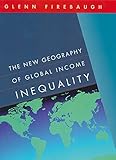The New Geography of Global Income Inequality / Glenn Firebaugh.
Material type: TextPublisher: Cambridge, MA : Harvard University Press, [2009]Copyright date: ©2006Description: 1 online resource (272 p.)Content type:
TextPublisher: Cambridge, MA : Harvard University Press, [2009]Copyright date: ©2006Description: 1 online resource (272 p.)Content type: - 9780674036895
- 339.2/1
- HC79.I5 -- F565 2003eb
- online - DeGruyter
| Item type | Current library | Call number | URL | Status | Notes | Barcode | |
|---|---|---|---|---|---|---|---|
 eBook
eBook
|
Biblioteca "Angelicum" Pont. Univ. S.Tommaso d'Aquino Nuvola online | online - DeGruyter (Browse shelf(Opens below)) | Online access | Not for loan (Accesso limitato) | Accesso per gli utenti autorizzati / Access for authorized users | (dgr)9780674036895 |
Frontmatter -- Contents -- Preface -- Part I. The New Geography Hypothesis -- Chapter 1. Massive Global Income Inequality: When Did It Arise and Why Does It Matter? -- Chapter 2. The Reversal of Historical Inequality Trends -- Part II. Measurement -- Chapter 3. How Is National Income Measured, and Can We Trust the Data? -- Chapter 4. Inequality: What It Is and How It Is Measured -- Part III. Evidence -- Chapter 5. What We Already Know -- Chapter 6. Income Inequality across Nations in the Late Twentieth Century -- Chapter 7. Weighted versus Unweighted Inequality: Key to the Divergence Debate -- Chapter 8. Continental Divides: Asia, Africa, and the Reversal of the Trend -- Chapter 9. Change in Income Inequality within Nations -- Part IV. Explanations and Predictions -- Chapter 10. Causes of the Inequality Transition -- Chapter 11. The Future of Global Income Inequality -- Epilogue: Does Rising Income Bring Greater Happiness ? -- Notes -- References -- Index
restricted access online access with authorization star
http://purl.org/coar/access_right/c_16ec
The surprising finding of this book is that, contrary to conventional wisdom, global income inequality is decreasing. Critics of globalization and others maintain that the spread of consumer capitalism is dramatically polarizing the worldwide distribution of income. But as the demographer Glenn Firebaugh carefully shows, income inequality for the world peaked in the late twentieth century and is now heading downward because of declining income inequality across nations. Furthermore, as income inequality declines across nations, it is rising within nations (though not as rapidly as it is declining across nations). Firebaugh claims that this historic transition represents a new geography of global income inequality in the twenty-first century. This book documents the new geography, describes its causes, and explains why other analysts have missed one of the defining features of our era—a transition in inequality that is reducing the importance of where a person is born in determining his or her future well-being.
Mode of access: Internet via World Wide Web.
In English.
Description based on online resource; title from PDF title page (publisher's Web site, viewed 30. Aug 2021)


